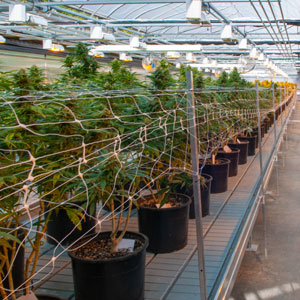Canadian Cannabis Conference 2015: Building the Marijuana Industry in Canada
 Yesterday at the Trump Hotel and Towers in downtown Toronto, Jacobs Securities hosted the Canadian Cannabis Conference to bring investors and cannabis businesses together. If there was anyone in the room with any doubt of the significance of the Canadian cannabis industry it was put to rest when, Richard Carleton, CEO of the Canadian Securities Exchange ( CSE ) admitted that the local joke that he is the President and CEO of the “Marijuana Business Exchange” is not far from the truth with 21% of the CSE market value being in the cannabis sector.
Yesterday at the Trump Hotel and Towers in downtown Toronto, Jacobs Securities hosted the Canadian Cannabis Conference to bring investors and cannabis businesses together. If there was anyone in the room with any doubt of the significance of the Canadian cannabis industry it was put to rest when, Richard Carleton, CEO of the Canadian Securities Exchange ( CSE ) admitted that the local joke that he is the President and CEO of the “Marijuana Business Exchange” is not far from the truth with 21% of the CSE market value being in the cannabis sector.
The day was organized such that the leaders of several publicly traded LPs as well as a few private LPs and a couple other businesses within the cannabis industry spoke in panels of three or four at a time. For the producers there were two common themes all agreed upon:
First there was a general expression of need to get doctors on board. It was understood that the maturing of the industry sees producers approaching the market in two distinct ways: one which focused directly on patient acquisition, and the other whose approach would be a more wholesale production model – less focused on patient acquisition and more focused on production efficiencies. However in both cases, increasing physician awareness of a licensed producer’s brand and the potential benefits of medical marijuana in general were stated as necessary to grow this industry.
 The second major theme of forward looking agreements amongst marijuana producers is that as the market matures, the economics of supply and demand will likely put pressure on price points. Therefore, the long-term success for marijuana production is dependent on maximizing efficiencies and developing a premium brand. Bruce Linton from Tweed was the first to comment on the value of a higher initial capital cost in order to save in ongoing operating costs. AbbaMedix CEO, Ray Rasouli, who became a licensed producer when they purchased RedeCan Pharm, reiterated the point saying that their focus was on efficiency and continuous improvement. Greenhouse producers like RedeCan and Hydropothecary feel that the greenhouse model gives them an advantage in becoming the low-cost producers. Meanwhile Peace Naturals has decided to stay with indoor production because they feel their processes give them an advantage in producing consistent quality medical marijuana.
The second major theme of forward looking agreements amongst marijuana producers is that as the market matures, the economics of supply and demand will likely put pressure on price points. Therefore, the long-term success for marijuana production is dependent on maximizing efficiencies and developing a premium brand. Bruce Linton from Tweed was the first to comment on the value of a higher initial capital cost in order to save in ongoing operating costs. AbbaMedix CEO, Ray Rasouli, who became a licensed producer when they purchased RedeCan Pharm, reiterated the point saying that their focus was on efficiency and continuous improvement. Greenhouse producers like RedeCan and Hydropothecary feel that the greenhouse model gives them an advantage in becoming the low-cost producers. Meanwhile Peace Naturals has decided to stay with indoor production because they feel their processes give them an advantage in producing consistent quality medical marijuana.
 Several of the existing Licensed Producers of medical marijuana have used GGS Structures for supplying efficient systems that lend agricultural production efficiencies to the specialized requirements of growing the cannabis plant under the strict regulations of Health Canada. At GGS we work with each grower to develop the best environment for their particular crop. We provide complete solutions for indoor growing in warehouse environments with complete environmental control, as well as providing greenhouse structures and controlled environments for growing marijuana within a production scale greenhouse.
Several of the existing Licensed Producers of medical marijuana have used GGS Structures for supplying efficient systems that lend agricultural production efficiencies to the specialized requirements of growing the cannabis plant under the strict regulations of Health Canada. At GGS we work with each grower to develop the best environment for their particular crop. We provide complete solutions for indoor growing in warehouse environments with complete environmental control, as well as providing greenhouse structures and controlled environments for growing marijuana within a production scale greenhouse.
In addition to the business side, three experts from marijuana clinics spoke to the need to have knowledge passed on to physicians. Dr. Danial Schecter stressed the difficulty in onboarding the 80% of doctors who are not opposed to medical marijuana but yet do not feel there is enough evidence for them to support it. His clinic, the Cannabinoid Medical Clinic, operates strictly on referrals from physicians, who according to Dr. Schecter are wary of prescribing medical marijuana themselves due to: the lack of guidelines (conditions/dosage/titration), fear of abuse, fear of regulatory bodies, being cautious in regards to not wanting to repeat the OxyContin mistake (which has been a physician induced addiction problem), not knowing enough about medical marijuana themselves, and not having the time to teach patients the correct ways to use medical marijuana.
When asked if there are any specific types of specialists that tend to be more willing to prescribe medical marijuana, the panel indicated pain doctors (in cases where opioids don’t work for their patients and palliative care). Also high on the list of treatments were insomnia, nausea, and eating needs. Cancer patients are also very good candidates, however oncologists thus far have been very resistant and much more likely to use a referral service for prescribing medical marijuana. Kyle Atkinson, president of Trauma Healing Centers, focuses primarily on military and first responders who have a need for PTSD treatment.
Perhaps the most encouraging comments about the Canadian growth potential within the cannabis sector came from Leslie Bocskor who traveled from Nevada to Toronto for this conference. As he sees it, Canadian companies have a tremendous edge entering the US market because of the publicly traded access to capital that Canadians have due to the federal acceptance of medical marijuana. The US market is exploding and we are seeing more Canadian companies enter the US market. Both Tilray and MedReleaf have publicly announced that they are among the applicants for building medical marijuana facilities in New York State. Several Canadian companies have also been approached to work in partnership in Jamaica, and Tilray has also applied in Uruguay. Aurora cannabis has begun building in Washington State. Bruce Linton, CEO of Tweed, attributes the global interest in Canadian cannabis companies to his belief that Canada mostly got the regulations right. At GGS we have seen this also as we have been approached by delegates from Israel, Uruguay, Jamaica, and all across the United States to provide our expertise in both commercial marijuana production facility design and in building research facilities to further study the cannabis plants.
Despite most of the conference being about positive promotion of the cannabis industry, Patrick Moen, General Counsel and Managing Director for Privateer, cautioned that public valuations of such young businesses was not yet warranted. Without more data he did not feel that it was right for companies to put themselves out to a retail market. In his mind the cannabis industry is as of yet one only for experienced investors.
Regardless of whether cannabis growers are building their business with the intention of going public or remaining private corporations, building cultivation facilities that maximize efficiency while taking advantage of your growers’ experience is paramount. If you would like to learn more about how GGS can help build your marijuana cultivation center contact us now.









